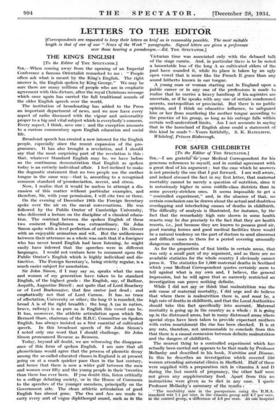LETTERS TO THE EDITOR
[Correspondents are requested to keep their letters as brief as is reasonably possible. The most suitable length is that of one of our " News of the Week" paragraphs. Signed letters are given a preference orer those bearing a pseudonYm.—Ed. THE SPECTATOR.]
THE KING'S ENGLISH
[To the Editor of THE SPECTATOR.] Sue,—When coming away from the opening of an Imperial Conference a famous Orientalist remarked to me : " People often ask what is meant by the King's English. The right answer is, the English spoken by King George." We may be sure there are many millions of people who are in emphatic agreement with this dictum, after the royal Christmas message which once again has carried the full traditional sounds of the older English speech over the world.
The institution of broadcasting has added to the Press an important department of news, and we now have every aspect of radio. discussed with the vigour and universality proper to a big and vital subject which is everybody's concern. Every aspect, I think, save one ; and the exception amounts to a curious commentary upon English educatiOn and social life.
Broadcast speech has created a new interest for the English people, especially since the recent expansion of the pro-. grammes. It has also brought a revelation, and I should say that the most surprising part of the revelation is this : that, whatever Standard Eglish may be, we have' before us the continuous demonstration that English as spoken today is an entirely individual affair. I feel inclined to make the dogmatic statement that no two people use the mother tongue in the same way—that is, according to a recognized common standard of4prominciation, accent, and stress.
Now, I realize that it would be useless to attempt a dis- cussion of this matter without particular examples, and therefore, Sir, with your permission, I will cite two or three.
On the evening of December 19th the Foreign Secretary spoke over the air on the naval conversations. He was followed by the Public Orator of Cambridge University, who delivered a lecture on the discipline of a classical educa- tion. The contrast between the spoken English of these two eminent Englishmen was extraordinary. Sir. John Simon spoke with a level perfection of utterance ; Dr. Glover with an enjoyable animation and wit. But the unlikenesses between their utterance as a whole_was such that if a foreigner who has never. heard English had: been listening, he might easily, have inferred that the speeches were in different languages. I would not venture here to comment upon the Public Orator's English which is highly individual and dis- tinctive. The Foreign Secretary's, being strictly regular, is a much easier subject for annotation.
Sir John Simon, if I may say so, speaks what the men and women of my generation have taken to be standard English,. of the highest grade :.the English, say, of Balfour, Asquith, Augustine Birrell ; not quite that, of Lord.Rosebery or of Lord Buckmaater, that fpre orator just dead ; and emphatically not that of Lord Curzon- It has, no trace of affectation, University or other; the long 0 is rounded, the broad A is of the right breadth ; the long A (as in nation, brave, railway) is as pure as in English this vowel can be. It has, moreover, the athletic articulation upon which Mr. Bernard Shaw, chairman, of the B.B.C. Committee on Spoken English, has always insisted as a first essential of cultivated speech. In this broadcast speech of Sir John Simon's I noted only one word that I should challenge. Sir John Simon pronounced Resume as Rezoom.
Today, beyond all doubt, we are witnessing the disappear- ance of this form of spoken English. I am -sure that all phoneticians would agree that the process of phonetic decay among the so-called educated classes in England is at present going on at a much quicker pace than in the last 'century, and hence that there is now a wider gulf between the men and women over fifty and the young people in their 'twenties than there has ever been. If you doubt this, listen critically to a college debating society, or in the House of Commons to the speeches of the younger members: principally on the Government side. The Clean athletic articulation of good English has alniost gcine. The Oes 'and Aes are made to carry every sort of 'vague diphthongal sound, such as in the
Victorian time was .associated only with the debased talk of the stage curate. And, in particular there is to be noted a lamentable loss of the long A as cultivated elders of the past have sounded it, while its place is taken by an ugly open vowel that is more like the French E grave than any sound hitherto known in our tongue.
A young man or woman starting out in England upon a Public career or in any one of the professions is made to realize that he carries a heavy handicap if his aspirates are uncertain, or if he 'speaks with any one of certain condemned accents, metropolitan or provincial. But there is no public opinion, and I think no educative influence, to safeguard him or her from murdering the mother tongue according to the practice of his group, so long as his outrage falls within certain well-understood-limits. Am I not accurate in saying that in the homeland of English alone could a statement of this kind be made ?—Yours faithfully, S. K. RATCLIFFE.
Whiteleaf, Princes Risborough.


































 Previous page
Previous page